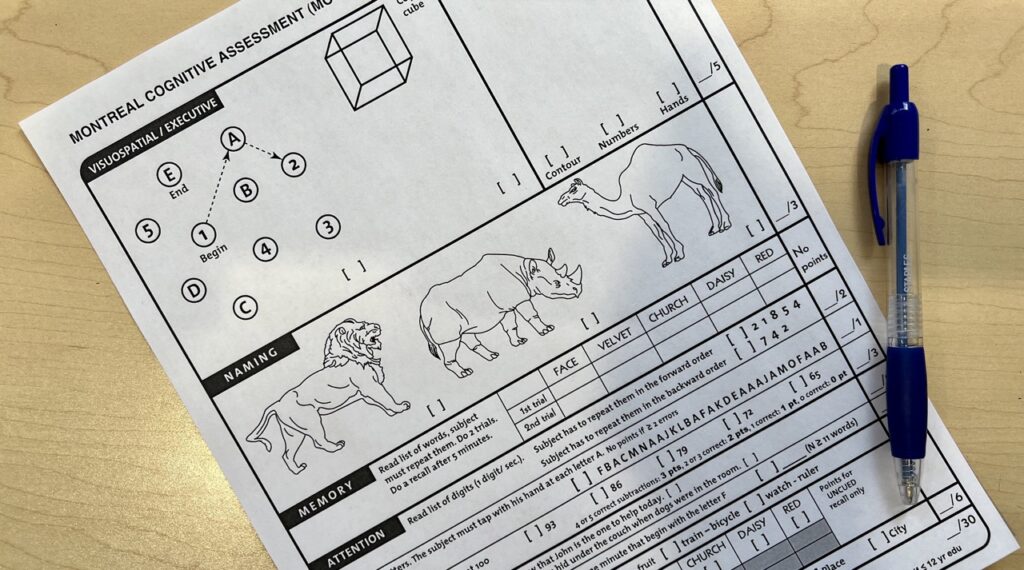Recently, I found myself sharing the road on California’s central coast with a visibly older individual whose driving behavior raised some serious concerns. This driver was swerving between lanes, struggling with speed control, and often seemed confused about their surroundings. I was left with no choice but to call 911, fearing that this person’s safety and that of others were at risk.
Today, we find ourselves sharing these roads with more senior citizens than ever before. While many older adults are capable drivers, the issue of dementia looms large.
In this post, I’ll discuss the regulations and recommendations surrounding driving with dementia and stress the importance of cognitive testing using the Montreal Cognitive Assessment (MOCA) test.
The Increasing Presence of Older Drivers
With an aging population, we’ve seen a significant increase in older adults on the road. While many older drivers are safe drivers, it’s important to acknowledge the potential impact of cognitive decline on driving abilities, especially in the case of dementia.
What does the California DMV recommend?
The California Department of Motor Vehicles (DMV) recognizes the need to balance individual freedoms with public safety. They have established guidelines that distinguish between mild and moderate/severe dementia when it comes to driving.
Here’s a quote from their site on driving with dementia.
“Drivers who have been diagnosed with dementia must attend a reexamination and must take a driver safety knowledge test. If the driver passes the test, then they may be asked to take a special driving Test or a Supplemental Driver Performance Evaluation.”
Here’s what you need to know:
Mild Dementia
If you or a loved one has mild dementia, it is possible to continue driving, but with certain conditions. The DMV “will schedule a reexamination within 6-12 months to reassess the progression of dementia. This is because mild dementia can rapidly progress to moderate or severe, even if the driver is not aware of that.”
You should also undergo regular medical evaluations and cognitive assessments to ensure your driving skills remain intact. It’s important to notify the DMV if you have been diagnosed with mild dementia.
Moderate to Severe dementia
In cases of moderate to severe dementia, driving is strongly discouraged, and the DMV may revoke your driver’s license. This decision is made in the interest of safety, as individuals with advanced dementia may pose significant risks on the road.
To learn more about the stages of dementia, watch this video here.
The Importance of Cognitive Testing

Regular cognitive assessments are essential for individuals with dementia and those concerned about their driving abilities. The Montreal Cognitive Assessment (MOCA) test is a widely recognized tool for evaluating cognitive function and the test can be taken over the phone in under 15 minutes.
It assesses various cognitive domains, including memory, executive functioning, delayed recall, visuospatial awareness, attention, and spatial awareness.
Taking the MOCA test can provide insights into one’s cognitive health and help determine whether they should continue driving. To learn more about the MoCA, read this article here or get started by taking the test below.
Remote Cognitive Assessment
Resources for older adults with dementia
There are a number of resources that can be helpful for caregivers or individuals who are experiencing mild dementia.
Support groups
Joining support groups for individuals with Alzheimer’s or dementia and their caregivers can be incredibly beneficial. These groups offer a safe space to share experiences, advice, and resources related to dementia and driving. They can also provide recommendations for local services and professionals experienced in dementia care.
Elderly Transportation Services
Many communities offer specialized transportation services for older adults, including those with dementia. These services provide a reliable and safe alternative to driving.
Safe driving courses
Several organizations offer safe driving courses tailored to older adults. These courses can help individuals with dementia improve their driving skills, and stay updated on any new regulations.
They also emphasize defensive driving techniques for dealing with cognitive challenges while driving.
Adaptive Vehicle Modifications
For those with mild dementia, vehicle modifications can make driving more manageable and safer. These modifications can include larger mirrors, adjusting the height of seats, or adding steering wheel aids
An occupational therapist can assess the individual’s specific needs and recommend appropriate modifications.
Conclusion
Driving with dementia in California is a complex issue that demands careful consideration of both individual rights and public safety. As we share the road with an increasing number of older adults, it’s crucial to be aware of the DMV’s recommendations for mild and moderate/severe dementia and to take the MOCA test seriously.
While mild dementia may allow some individuals to continue driving with regular assessments, it’s essential to prioritize safety and seek alternative transportation options when necessary. No one wants to find themselves in a situation where they must call 911 due to an unsafe driver, as I did that sunny afternoon. Let’s work together to ensure the roads of California remain safe for everyone, regardless of age or cognitive condition.

David is the lead editor of OT Focus. He has been practicing as an Occupational Therapist since 2013. He specializes in acute care, hand therapy, and ergonomics.




